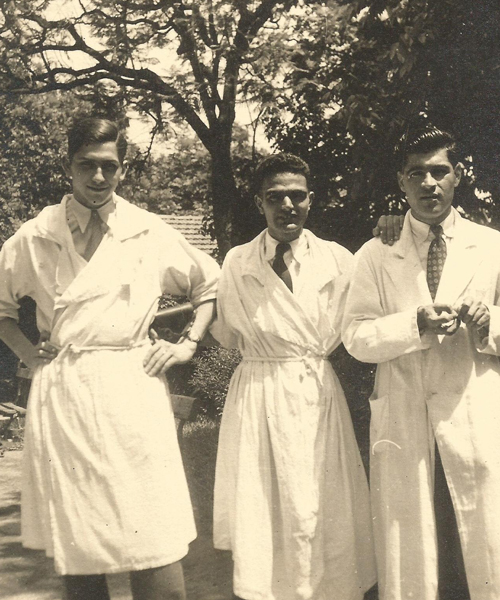A country where the sun shines all year cannot let a great number of its people live in darkness. Tunisia, long troubled by a high rate of vision problems, today is at the forefront in the fight against preventable  blindness in North Africa. For five decades the country has been offering high-level vision therapies thanks to Ridha Mabrouk, a passionate pioneer in innovative strategies for eye treatments, and a corps of medical professionals trained under his guidance.
blindness in North Africa. For five decades the country has been offering high-level vision therapies thanks to Ridha Mabrouk, a passionate pioneer in innovative strategies for eye treatments, and a corps of medical professionals trained under his guidance.
The first spark of inspiration has led to a transformative movement, focused early on the prevalence of cataracts and trachoma, and later evolved to provide corneal transplants and both care and education to support people with low-vision. The Nadi Al Bassar (NAB) North African Center for Sight started in 1964, in Department A at the hospital. It was recognised International NGO in 1983, then a National Institution in 1988. In June 2015, was held its fifty years ceremonial. Its influence has expanded from the countries of the Maghreb across much of the world.
"My idea was how to render useful for the others what I have been learning. We decided to make good use of our capacities and make Tunisia independent in eye education and health," says Ridha Mabrouk.
From a small but ambitious start, Mabrouk and his colleagues have built Nadi Al Bassar into a global leader. Not only has it helped to cure blindness and to empower people with limited vision, but it has nurtured networks of care, teaching and scholar-exchange that extend throughout Africa and into Europe, Asia and North America. The centre today is a model for health care and research in the developing world, and a model as well for South-South cooperation in science.
Ridha Mabrouk, now 96, personifies a remarkable story of inspiration and commitment to public service. He and his colleagues have been a driving force behind health initiatives to treat people suffering from serious eye problems and to educate people with low-vision so that they could study, work and pursue their dreams.
The arc of progress
Ridha Mabrouk earned his PhD in ophthalmology from Paris University (1951). Early in his career, he came to realize the devastating impact of two preventable eye diseases: cataracts and trachoma.
Cataracts are a clouding of the lens of the eye; often cataracts result from aging, but also from injuries or other eye diseases. According to the World Health Organization (WHO), cataracts are responsible for 51% of blindness globally, making them the single leading cause of blindness.
Trachoma is the top infectious cause of blindness, WHO reports, and the world's leading cause of preventable blindness. As the bacterial infection of trachoma advances, it scars the inside of the eyelid, and as the infection worsens, the eyelids curl inward so that the lashes scrape against the cornea. This can lead to severe and sometimes permanent reduction or loss of vision.
Taken together, the two public health issues cause immense human suffering, and in some developing countries they are so widespread that they slow economic development. In the middle of the 20th century, those diseases and their effects were endemic in Tunisia.
The new orientation for eye-care was emerging as early as the mid-1950. Mabrouk and his colleagues introduced a subtle but important linguistic change: People with eye problems were not handicapped, but rather "visual-deficient patients." The eye problems should not be seen as permanent, then, but as a condition that could be treated.
In 1959, Mabrouk was secretary-general of the Tunisian Ophthalmological Society. He had organised the first Maghrebian colloquium of ophthalmology. That was the first international medical congress after Tunisia was freed from French colonial rule, and it proved to be a pivotal occasion for discussing important questions with his colleagues.
"The first one was to convince them to start working together," Mabrouk explained in a recent interview. "The second one was how to fill the gap after the departure of our French colleagues." Those discussions set the stage for the future of eye care in Tunisia and the idea of an Eye Foundation was initiated.
A year later, Mabrouk took a post at the government's Eye Institute as a full-time assistant, soon after he became head of department and, in 1964, a faculty professor. "At the hospital," he recalls, "we were doing basic interventions such as refraction, cataract and glaucoma surgery."
Historic innovations
From the '60s to the '80s, Ridha Mabrouk and his colleagues introduced innovations that would prove historic for Tunisia and eventually for much of Africa. They offered out-of-the-hospital, in-home care in various parts of the country, launching an initiative that he dubbed "najda" – non-expected help. Later he and his team offered treatment also in neighbouring countries such as Libya, Mauritania and Senegal.
In addition, they set in motion programmes to train local professionals – ophthalmologists and technicians in the eye-care sector – for example, by organizing exchange programmes for his staff, either in Tunisia inviting lecturers, or international organisations such ORBIS; or in universities of friendly countries.
After these successful initiatives, founding the Nadi Al Bassar centre was a natural evolution.
"We realized that the best way to start was by launching a private non-governmental, non-political charity, dedicated to educational, medical, scientific and social works," recalls Mabrouk, who is currently NAB's past president and founder.
Since its inception, NAB has given priority to the training and education of medical personnel as an essential requirement for providing the highest standards of therapy. To offer more qualified assistance to Tunisian patients, he urged people from his team to search for stronger training: some colleagues temporary moved to Les Invalides Hospital in Paris, France, to receive training and become low-vision specialists.
In its early days, NAB had to cope with challenges. Along with chronic lack of ophthalmologists, the center was facing shortage of medical equipment and could perform only a small number of surgeries every week, not enough to cover local needs.
Nonetheless, NAB's doctors were pioneers in encouraging cornea-grafting and other advanced ways to save sight. "Grafting became a necessity, because trachoma disease had left many people with cornea opacity," Mabrouk explains. In the beginning, he had to import transparent corneas from abroad. Then, as he adds, NAB decided to establish an Eye Bank to attract cornea donors.
From its inception, the Nadi Al Bassar Center has grown, accomplishing important goals. But its values and mission remain constant: "Prevention remains a key step," Mabrouk says, "and basic education is a must."
An international impact
Ridha Mabrouk says " ... following Salam, our objective is to educate people to help themselves, not to count the number of cases treated. Because 'All what is counted may not count.' " (Einstein)
"Till 2003, we visited many Maghrebian, African an Arab countries, supported by our national donators. NAB statute and the NGO criteria do not allow us to get any Bank or government financial."
"Today at NAB, we are able to offer all kinds of interventions, from cornea-grafting to treatment of retina degeneration," he adds. Surgical campaigns have been organized in Libya and Mauritania; training programmes were launched not just in in Tunisia, but also in Niger, Mauritania, Mali and Senegal.
Nadi Al Bassar leaders early recognized the essential value of public engagement, an activity embraced by leading science centres worldwide. NAB highlights the importance of eye care through public awareness campaigns via local newspapers, radio stations, and television stations – as well as through drawing contests at schools. "We believe in efficient cooperation between the medical corporation, the medical personnel at the hospital and the community itself, including young children," explains Mabrouk.
Today NAB is projecting towards the future. The centre has been among the first supporters of Vision 2020: the right to sight. Vision 2020, a programme launched in 1999 within the European Union's Horizon 2020. It is aimed at eliminating avoidable blindness by year 2020. “We have then the obligation to do it first in our country” Mabrouk says. In the intervening years, Ridha Mabrouk has built an influential scientific career in ophthalmology working between Paris, Moorfields, Harvard as WHO leader Grantee, San Francisco, Stockholm, Barcelona and New York. Today he is still active, writing a book entitled “In the Service of Others” on the urgency of contributing to the right to sight.
For the next year, he plans to establish a course on visual sciences and economic and social development, which will be named after Pakistani physicist and Nobel laureate Abdus Salam, the founder of the International Center for Theoretical Physics (ICTP) and of TWAS in Trieste, Italy.
During its decades of activity, the Nadi Al Bassar Center has established a virtuous process where South-South solidarity has created enormous human benefits – a model for regional leadership. This has bloomed into South-North cooperation, as well.
"For all we have accomplished, we are indebted to many, including universities and international organizations. We cannot forget the Tunisians who contributed by all kinds of donations. But there is still a lot to do for the coming generations," Mabrouk concludes.
Cristina Serra

